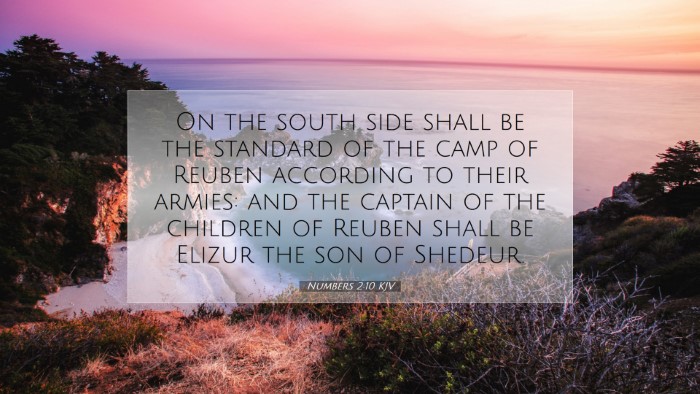Commentary on Numbers 2:10
Verse Text: "On the south side shall be the standard of the camp of Reuben according to their armies: and the captain of the children of Reuben shall be Eliezer the son of Shedeur."
Introduction
The book of Numbers outlines the organization of the Israelites during their journey through the wilderness. In this verse, we see the specific instructions regarding the arrangement of the tribes around the Tabernacle. The positioning of the tribes is not merely a logistical concern, but it holds significant spiritual and theological implications.
Historical Context
The Israelites, having escaped slavery in Egypt, are in the process of establishing their identity as a nation under God. This community organization is vital as it sets the stage for worship and interaction with the Divine. The census in Numbers focuses on the tribal structure and the importance of order within the community.
Insights from Public Domain Commentaries
Matthew Henry's Commentary
Matthew Henry emphasizes that God's arrangement of the tribes reflects His authority and wisdom. Each tribe, represented by its standard, signifies a larger spiritual truth: the unity of the community under God’s guidance. The choice of Reuben, the firstborn, as the leader of the southern camp, highlights God’s sovereignty in choosing leaders and establishes a sense of honor among the tribes.
Albert Barnes' Notes on the Bible
Barnes sheds light on the significance of Reuben's position as the southern standard. He notes that the children of Reuben were to camp nearest to the Tabernacle, demonstrating the importance of proximity to the divine presence. This underscores a theological principle of the importance of being close to God, especially for leaders. The mention of Eliezer, the son of Shedeur, reveals God’s continued choice among those He appoints, suggesting the importance of lineage and divine selection in leadership roles.
Adam Clarke's Commentary
Clarke offers an analysis of the military and practical implications of this positioning. By placing Reuben in the south, the Israelites were provided with a strategic advantage in their encampment. This organization speaks to the divine order that God prescribes not just for worship but for practical living as a nation. He emphasizes that this structure serves both a physical and spiritual purpose, keeping the Israelite identity intact as they journey towards the Promised Land.
Theological Implications
Through the careful arrangement of the tribes, we glean principles about God’s method of governance within His people:
- The importance of leadership: Each tribe had specific responsibilities and roles, highlighting the need for effective leadership within the community.
- Divine order: The arrangement reflects not just physical order but spiritual order, with each tribe having its place in the larger narrative of God’s plan.
- Proximity to God: The closer tribes are to the Tabernacle, the more significant their role in worship and community life becomes.
Lessons for Today’s Believers
From Numbers 2:10, we can draw important lessons for contemporary Christian communities. The organization of the church, the roles of leadership, and the pursuit of divine proximity are all areas touched by this scripture. Just as God provided a structure for Israel, He also calls modern believers to a communal and organized approach to life in faith.
Practical Applications
- Recognizing Leadership: Acknowledge the leaders within your community. Understand that God has a purpose for those appointed to lead.
- Emphasizing Order: Strive for order in church activities, recognizing that it reflects God’s nature.
- Seeking Proximity: Actively seek to draw closer to God through worship and service.
Conclusion
Numbers 2:10 serves as a reminder of God’s providence and order in the lives of His people. The insights gathered from Matthew Henry, Albert Barnes, and Adam Clarke illuminate the importance of this verse within both its historical context and its present-day applications. As believers, the structure of our community serves not only as a means to function but also as a testament to our collective desire to follow God’s leading.


